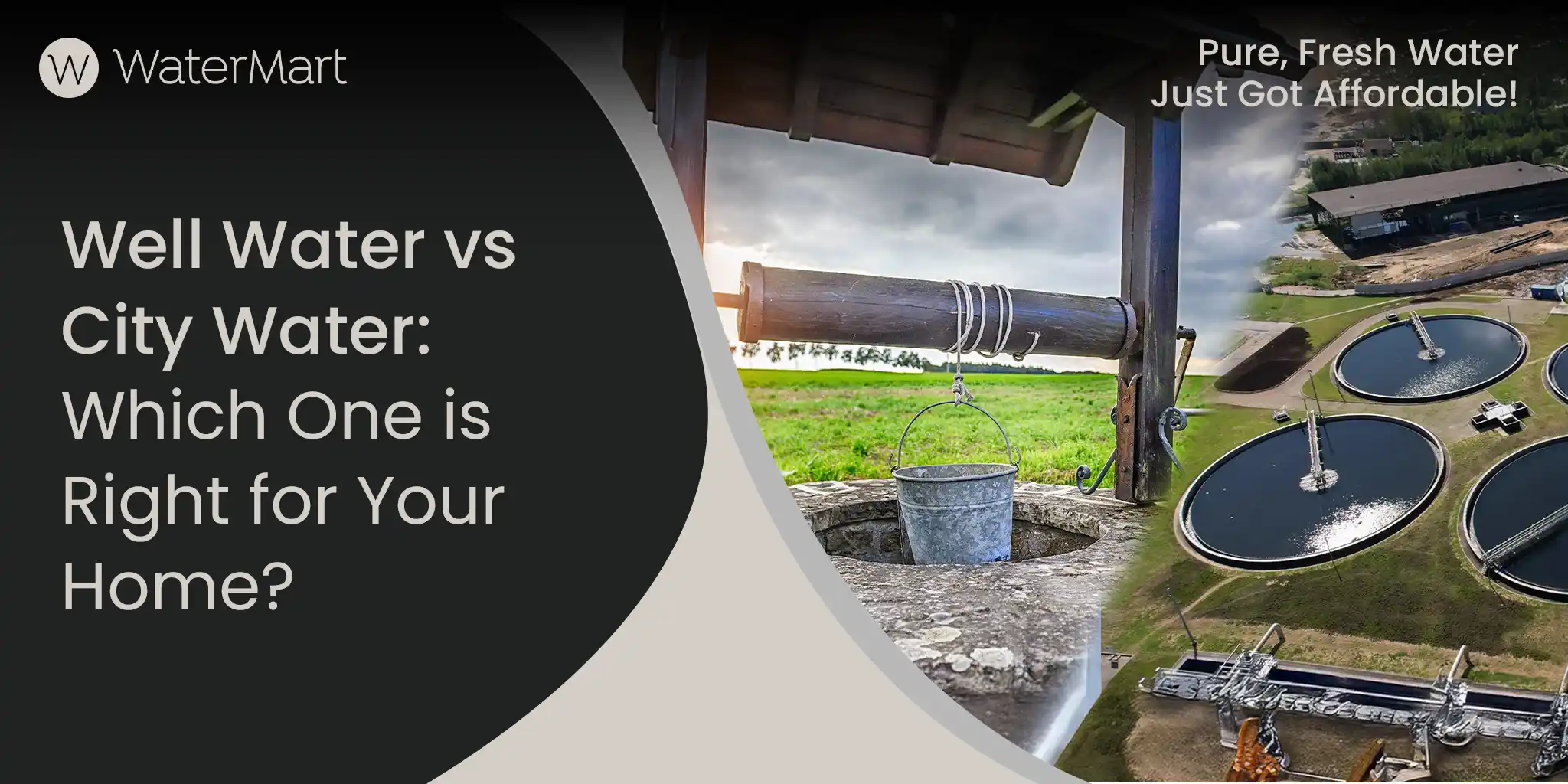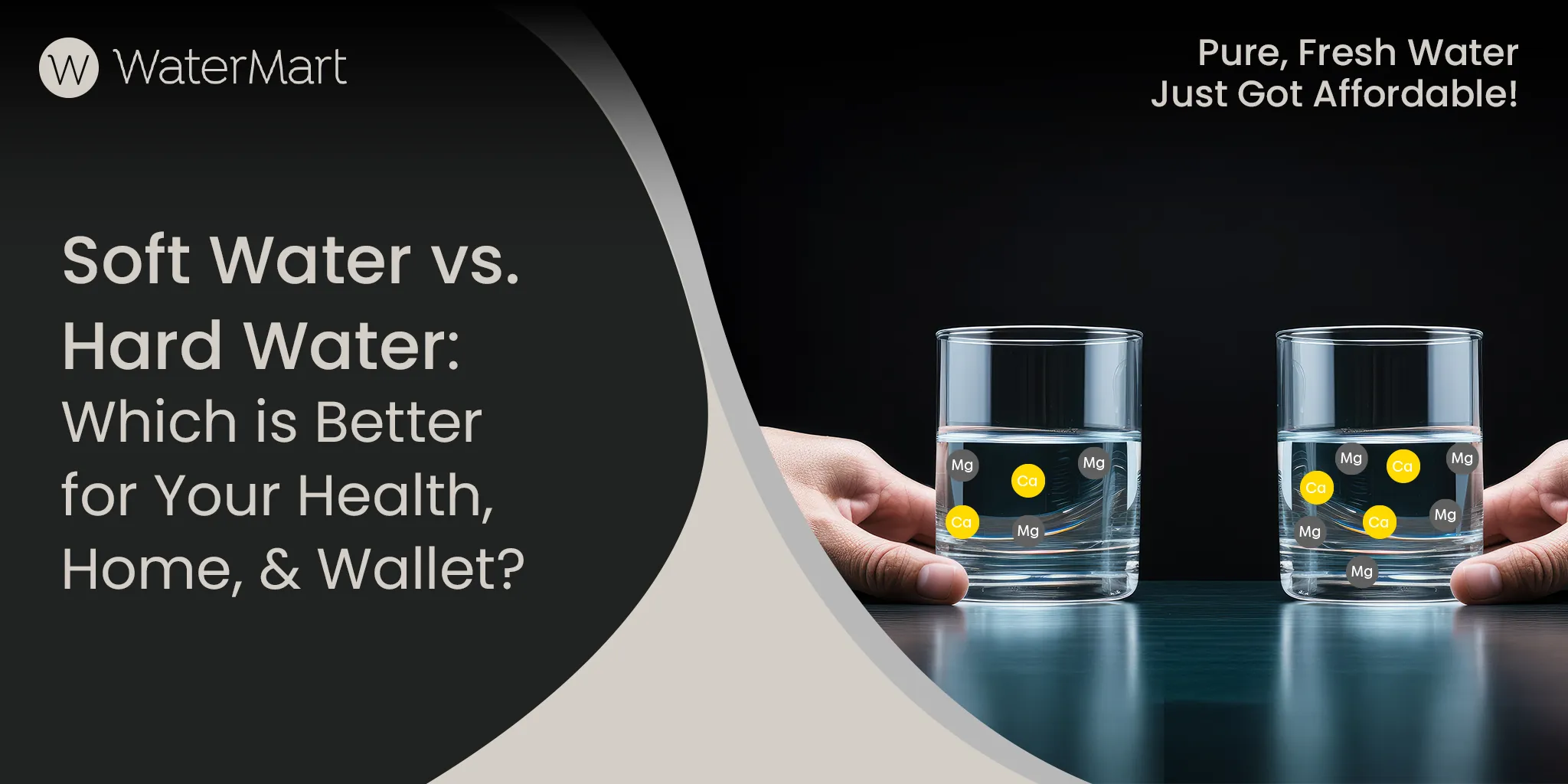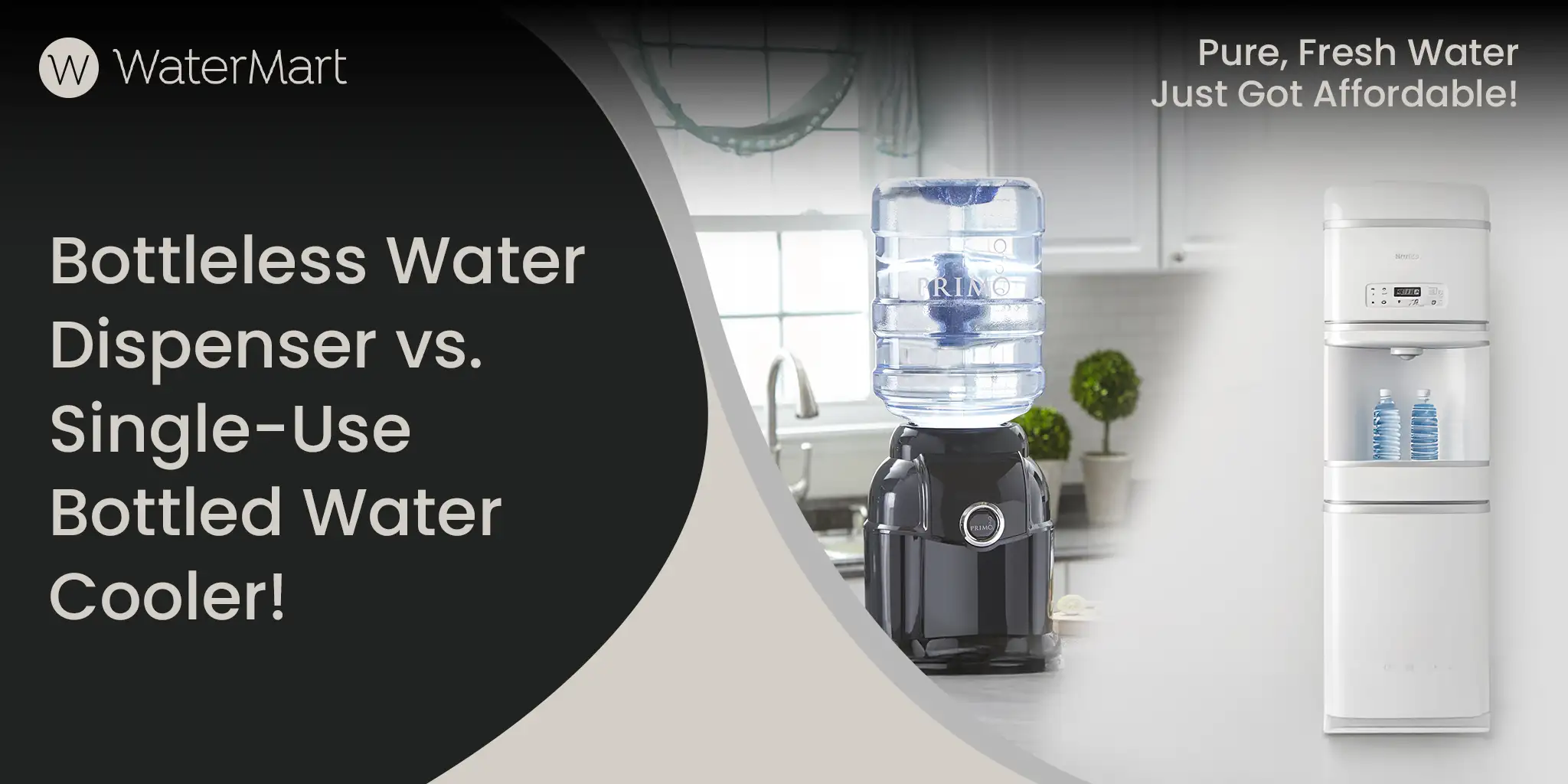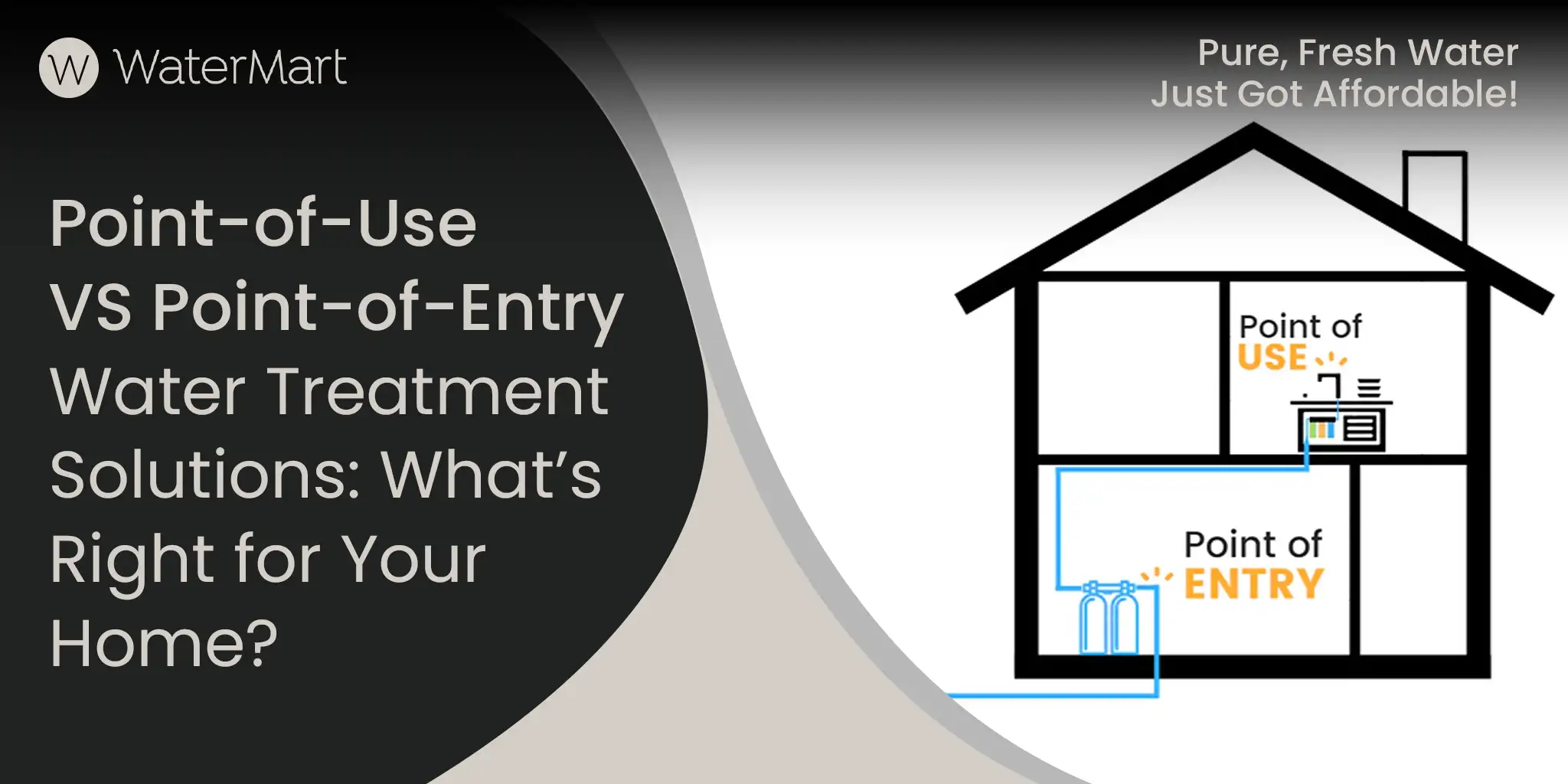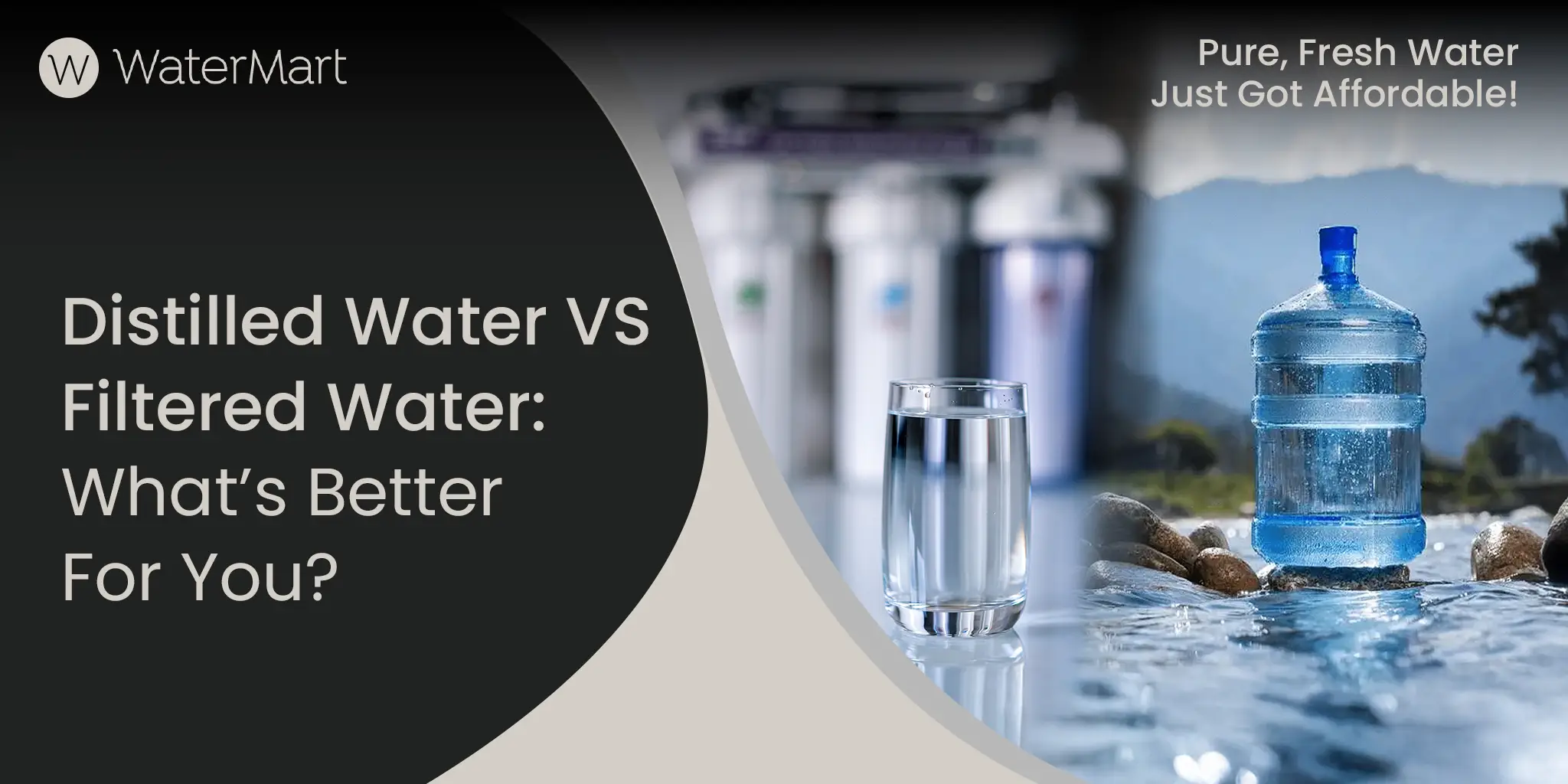Your cart is currently empty!
Well Water vs City Water: Which One is Right for Your Home?
Deciding whether well water is better than city water? This depends on your location, budget, and how much control you want over your water quality. Each source has its trade-offs. City water offers regulated service, but with recurring costs. Whereas, well water offers more independence and is free to use, but it demands maintenance.
So, how do you choose between well water and city water for household or businesses? By the end of this article, you’ll have your answer!
Let’s start with a well water vs city water comparison:
| Feature | Well water | City water |
| Source | Groundwater accessed through a drilled well in an aquifer | Surface/groundwater treated by the city |
| Ownership | Private (homeowner-owned) | Public (managed and regulated by municipal agencies) |
| Monthly Cost | No water bill | Billed monthly by the city |
| Initial Setup cost | High upfront cost for drilling and equipment | Low to no setup cost (already part of existing infrastructure) |
| Water Quality Control | Fully managed by a homeowner | Controlled by municipal authorities |
| Common Contaminants | Bacteria, nitrates, heavy metals, and precipitation runoff | Chlorine, lead from pipes, and treatment byproducts |
| Taste Profile | Mineral-rich and with a more natural taste | Treated and tastes flat or chlorinated |
| Home Appliances Impact | Can stain or clog appliances if untreated | Gentler on appliances, but it depends on the pipe condition |
| Home Appliances Impact | Can stain or clog appliances if untreated | Gentler on appliances, but it depends on the pipe condition |
| Water Pressure Control | Managed by a private pump system | Maintained by municipal systems |
| Requires Electricity to Access | Yes (the pump system needs electricity or a generator) | Usually not affected by short power outages |
| Maintenance Requirements | Regular testing, pump upkeep, and filter replacements | Minimal as the city handles the main systems |
| Custom Water Treatment Options | Fully customizable with softeners, RO, UV | Add-ons like pitcher filters or whole-house systems are available |
| Ideal Users | Rural homes, off-grid, high water consumption | Urban/suburban homes connected to the city supply |
What is Well Water & Where Does It Come From?
A well is a private water source created by drilling into the ground until reaching an underground aquifer. Well water comes from this aquifer (A layer of rock, sand, and soil that holds water from rain, snow, and other forms of precipitation). A pump system is installed to move the water up to the property. This way, you get water into your plumbing like any standard system.
While this environment-filtered water can contain healthy minerals, it also carries bacteria, nitrate, parasites, chemical residues, or arsenic, especially without proper testing and maintenance. The aquifer itself may be affected by farming, septic leaks, or old plumbing.
Still, according to Health Canada 2025, nearly 4 million Canadians use private wells as their main water source. In New Brunswick, about 40% of the population depends on well systems, and over 46% in Nova Scotia do the same. Many urban and suburban communities in Ontario also rely on wells, despite inconsistent testing rates.
Pros and Cons of Well Water
What are the advantages and disadvantages of well water?– It’s a common question, and many believe well water means less responsibility. But it comes with more demand. It’s a reliable option in many rural areas, but still weigh your options by checking both the upsides and downsides.
Pros Of Well Water
- No monthly water bills
Because you’re using your own source, there’s no monthly charge from the municipality.
- Naturally Mineral-Rich Water
Water from an aquifer often contains beneficial minerals like calcium and magnesium. This adds to its taste and supports daily consumption needs.
- Independence from municipal systems
You’re not at the mercy of city-wide outages, restrictions, or rate hikes.
- Often tastes fresher and more natural
Untreated water from the ground often has a more natural flavor, especially if properly filtered.
- Not affected by city-wide issues or restrictions
When cities issue boil-water advisories or impose water bans, your private well is unaffected.
Cons Of Well Water
- Requires regular testing and maintenance
You’re fully responsible for making sure it’s safe to drink.
- High upfront cost for drilling and equipment
Installing a well, pump, tank, and filtration system is expensive upfront. Costs vary by property and depth needed to reach the aquifer.
- Risk of contamination
Pathogens, bacteria, heavy metals, and nitrates can enter the aquifer from surrounding land use.
- Needs electricity to operate (pump)
A power outage means no water, unless you have a backup generator or solar power.
- Can stain fixtures or damage appliances
High mineral content in well water means hard water. It can cause buildup in pipes, discolor plumbing fixtures, and reduce the lifespan of home appliances.
What is City Water?
City water is the main supply used by most urban households across Canada. In Ontario urban areas, more than 80% use city-connected residential water. It’s treated by public agencies, piped into homes, and billed monthly. You don’t have to manage it, just turn on the tap and it’s there. But the system behind it is more complex than it looks.
City water comes from surface sources like lakes and rivers. The “natural” water is processed at a treatment plant, where it’s filtered and disinfected. This processed water has chlorine, fluoride, and other chemicals. It’s sent through pipelines to the city after following strict federal and provincial regulations for safety and testing.
In 2025, over 99.22% of Canada’s population relies on municipal water systems (source). That’s because Canada’s city water is tested thoroughly and is of high quality. Globally, Canada ranks 18th for sanitation and drinking water (EPI 2024), with a water quality score of 99.1, placing it among the top nations.
Pros and Cons of City Water
Using city water means easy access, minimal responsibility, and routine safety checks. But it also comes with rising costs and limited control over treatment. Here’s what to weigh before relying fully on municipal service.
Pros of City Water
- Regulated and Routinely Tested
City water is treated according to Health Canada and provincial guidelines. That means you’re not the one scheduling lab reports or buying test kits.
- Consistent Access Across Urban and Suburban Areas
The municipal supply reaches most urban and suburban homes. It’s widely available, even in many rural communities.
- Lower Upfront Cost for Setup
Connections to city water are typically already built into urban homes.
- No Personal Maintenance Required
The city owns and services the system, including pipes and treatment plants. You won’t deal with breakdowns or unexpected filter replacements.
- Usually Stays On During Power Outages
Because the system doesn’t rely on your electricity, water keeps flowing during local blackouts, unless there’s a larger infrastructure issue.
Cons of City Water
- Monthly Water Bills Keep Rising
You’re billed based on usage. In Canada, water rates have climbed nearly 80% over the past decade. Some cities have even seen higher spikes.
- Chemical Treatment
Chlorine, fluoride, and other chemicals are added to disinfect the supply. They’re safe, but some people dislike the taste or have health concerns.
- Risk of Contamination from Old Infrastructure
Even after treatment, contamination can happen in aging underground plumbing, especially where maintenance is overdue or corrosion is present.
- Taste Not Always Appealing
Some users report a slight chemical or metallic aftertaste. While not harmful, it’s less crisp than untreated well water for many people.
- Limited Control and City-Imposed Usage Rules
You’re tied to the city’s rules. During droughts or emergencies, water use can be restricted or fully shut off. You have no say in service disruptions.
How to Test the Quality of Well and City Water?
Both well water and city water are safe to drink and use, but the quality of your water decides whether it’s good for your safety and health. Key things to watch for include,
- pH levels (ideal range: 6.5–8.5)
- Chlorine (below 4 mg/L)
- Fluoride (around 0.7 mg/L)
- Hardness levels (60mg/L -120 mg/L)
- Contaminants like bacteria, parasites, viruses, and nitrate (less than 10 mg/L)
- Levels of metal like lead or iron (sign includes problems in your plumbing)
Regular testing helps detect all of these. Only a proper report brings peace of mind, catches early issues, and helps you pick the right solution if needed. Here are two ways to test the quality of well and city water:
How To DIY Test The Quality Of Water?
For basic testing at home, a few easy methods can give early signs of problems:
- Water Testing Kits: Comprehensive kits check for hardness, pH, chlorine, and more. They offer a broader scan, but results can vary based on usage.
- Test Strips (Fastest and cheapest method). Dip a strip in water to spot issues like high chlorine or strange pH levels.
- Visual and smell Inspection: Cloudy color, metallic smell, or rotten egg odor could signal rust, pipe issues, filter failures, or bacterial growth.
Which Things Should Be Tested in the Lab?
DIY methods are useful, but should not replace full professional testing. When you need full confidence about your water’s quality, lab testing is the safest option:
- Bacterial Contamination Test: Looks for bacteria, parasites, and viruses to confirm safety.
- Nitrate and Nitrite Levels Test: Checks fertilizer runoff contamination, important for health.
- pH Levels Test: Balances between corrosion risk and drinking safety.
- Water Hardness and Heavy Metals Tests: Find minerals, metals, and corrosion from old pipes.
- Chlorine and Chloramine Test: Verifies treatment chemicals are within a safe range.
- Fluoride Levels Test: Confirms healthy fluoride dosing without overexposure risks.
At WaterMart, we offer a free test where we test your water quality comprehensively. Call now.
Best Water Treatment Options for Well and City Water
The right system for your home water can only be correctly chosen after a water test. Both well water and city water need thorough testing. Here’s a practical guide to the best solutions for well water and municipal water!
For Well Water
Well water means you’re likely dealing with minerals, bacteria, and even potential metal contamination. Here are the best options to get safe water, free from all contaminants!
- UV Water Purifiers
UV systems use ultraviolet light to neutralize bacteria, viruses, and parasites. It’s great for well water as it retains taste and has no added chemicals involved. These are essential if your well is exposed to surface runoff or livestock.
- Reverse Osmosis (RO)
RO systems push water through a membrane that traps dissolved salts, nitrates, arsenic, and even some pesticides. They’re ideal when your well has noticeable taste issues or failed water tests. Explore the Tankless RO and see the Standard RO System here.
- Water Softeners
Hard water means high mineral content, primarily calcium and magnesium. A water softener system removes calcium and magnesium. This system helps prevent buildup on fixtures and extends appliance life. Dealing with buildup or clogged appliances? Check out the WaterMart Water Softener System.
- Iron Filters
If your water leaves rust stains or has a metallic smell, you’re likely dealing with high iron or manganese. Iron filters reduce both to protect your laundry, plumbing, and fixtures. Explore our Iron Filters via Whole-House Carbon Options.
- Carbon Filters
Carbon is great for filtering out odours, VOCs, and pesticides. It also improves taste, especially helpful if your well water has earthy or musty tones. Try our Multi-Stage Carbon System to improve the smell of your well water.
For City Water
Even if you’re using city water, that doesn’t mean it’s perfect. It’s regulated, but can still carry chlorine, fluoride, and sediment, not to mention whatever is picked up from aging pipes on the way to your faucet. Here are the best water treatment options:
- Activated Carbon Filters
These filters are designed to remove chlorine, bad taste, and chemical odours. They’re a smart starting point for people who want better-tasting water without heavy installs. We recommend the Multi-Stage Carbon System for small areas and the GAC Carbon Filter for whole-house water filtration.
- Pitcher Filters
An easy entry point for better water. These reduce chlorine, particulates, and minor contaminants, making them great for drinking or filling up the dog bowl.
- Whole-House Filters
These systems filter all water entering your home, helping with chloramines, sediment, and overall taste and odour. Good for large households and families with sensitive skin. We offer a Whole-House Chloramine Reduction System that doesn’t require costly maintenance.
- Reverse Osmosis
Even city water can carry fluoride, microplastics, and residual chemicals. RO is one of the most effective filtration options if you want extra-clean drinking water, making it easy to compare its benefits in comparison of mineral water & RO water.
We install a Standard RO System. You also get an affordable RO option with the Pentair RO System.
- Shower Filters
City water often contains chlorine, which can dry out your skin and hair. A shower filter helps reduce that exposure and is an easy install for people with sensitivity issues.
Still Unsure? Book Your Free Water Assessment!
If you’re unsure about your water quality, WaterMart is a great place to start. We offer a free assessment to help you get clear answers. Our service includes thorough testing and a detailed report to highlight any health and safety concerns. Get your property’s water tested by experts. We’ll help find the right treatment for better consumption and long-term confidence, and give an installation cost breakdown as well!
Conclusion
Choosing between well and city water depends on your home’s needs, maintenance ability, and comfort with local supply standards. Regular testing and proper filtration help you maintain safety, no matter the source. Every house deserves clean, reliable water without worrying about hidden issues or unsafe consumption. Take advantage of WaterMart’s trusted service to manage your water smartly.
